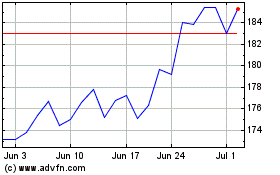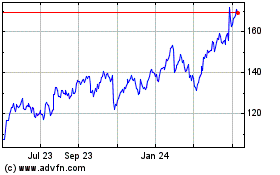Google Nears a Win in EU -- WSJ
January 11 2019 - 3:02AM
Dow Jones News
By Sam Schechner
This article is being republished as part of our daily
reproduction of WSJ.com articles that also appeared in the U.S.
print edition of The Wall Street Journal (January 11, 2019).
Google and other search engines shouldn't be forced to apply the
European Union's "right to be forgotten" beyond the bloc's borders,
an adviser to the EU's top court said Thursday, citing a potential
threat to free expression.
The recommendation, if followed by the EU's Luxembourg-based
Court of Justice, would be a major victory for Google, a unit of
Alphabet Inc., which for three years has been fighting an order
from France's privacy regulator to apply the EU principle
globally.
At issue in the case is the right, established by the court in
2014, for EU residents to demand that search engines remove links
containing personal information -- such as a home address -- from
searches for their names. Under the 2014 ruling, search engines
must balance those requests against the public's right to access a
link associated with the searched-for name, taking into account,
for instance, whether the person is a public figure.
Maciej Szpunar, an advocate general for the court, argued in
Thursday's nonbinding opinion that if the EU orders removal of
content from websites accessed outside the region, there is a
danger that other jurisdictions would use their laws to block
information from being accessible within the EU.
"There is a real risk of reducing freedom of expression to the
lowest common denominator across Europe and the world," Mr. Szpunar
wrote.
Backed by an array of free-speech advocates, Google has taken a
similar position, arguing that expanding the territorial scope of
the right to be forgotten would infringe on other countries'
sovereignty and encourage dictators and tyrants to assert control
over content published beyond their countries' borders. The EU's
executive arm also argued in September that the right shouldn't be
extended overseas.
Since the court decision in 2014, Google has removed 1.1 million
links from search results in the EU, while leaving the links intact
for the same searches conducted outside Europe.
In 2015, France's privacy regulator, CNIL, ordered Google to
expand its takedowns to any search for the given individual's name,
regardless of where the searcher is located. CNIL argued that the
right to be forgotten is empty if it can be dodged by spoofing
one's location, for instance by connecting to a VPN. The regulator
later fined Google EUR100,000 ($115,000) when it didn't comply.
Google appealed the order in a French court, which referred the
question to the EU's Court of Justice.
A final decision is expected in coming months from the court,
which isn't obliged to follow an advocate general's opinion, but
often does. No further appeal is possible within the EU.
Thursday's opinion didn't entirely back Google. Mr. Szpunar
recommended slightly expanding how Google applies the right to be
forgotten to make its application uniform across all Google
websites in the EU.
Currently, Google removes results from searches for an EU
resident's name when conducted via EU versions of its site. It also
does takedowns from non-EU versions of its site, but only if the
search is conducted from within the country of the EU resident who
requested the removals.
The advocate general recommended ordering Google to remove
results from searches for an EU resident's name on any version of
Google when accessed from any EU country.
Write to Sam Schechner at sam.schechner@wsj.com
(END) Dow Jones Newswires
January 11, 2019 02:47 ET (07:47 GMT)
Copyright (c) 2019 Dow Jones & Company, Inc.
Alphabet (NASDAQ:GOOGL)
Historical Stock Chart
From Mar 2024 to Apr 2024

Alphabet (NASDAQ:GOOGL)
Historical Stock Chart
From Apr 2023 to Apr 2024
